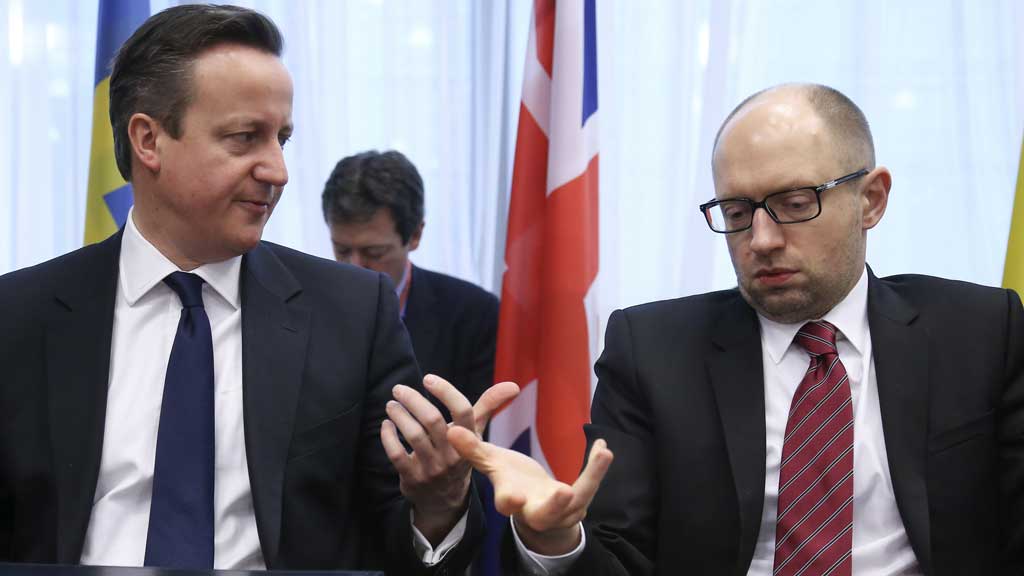EU leaders sign agreement with Ukraine
David Cameron and other European leaders sign an association agreement with Ukraine that extends the EU’s sphere of influence but risks antagonising Russia.

The agreement, which aligns the new government in Kiev more closely with the EU, was rejected by former president Viktor Yanykovych, triggering protests which led to his removal from power.
Interim Prime Minister Arseniy Yatsenyuk, pictured above, travelled to Brussels to sign the deal, following Russia’s annexation of Ukraine’s Crimea region.
The upper house of the Russian parliament approved the annexation, which follows a referendum in Crimea at the weekend. President Vladimir Putin finalised the move on Friday with his signature.
European Council President Herman van Rompuy said the agreement with Ukraine reflected the country’s “popular yearning for a decent life as a nation, for a European way of life”. Trade barrierrs are now expected to be lifted.
What does an association agreement actually mean if Russia can annex part of a country that nearly got one four months ago? Read Gary Gibbon’s blog.
Sanctions
Russia has suffered financial consequences in the wake of US sanctions – with stock prices plummeting and ratings agencies downgrading the country’s status.
On Thursday, US President Barack Obama expanded the list of US sanctions against Russia to include several prominent billionaires and the Bank Rossiya, which has close ties to leading Kremlin figures. President Putin vowed to protect the bank and keep his salary there.
For now, I see no severe consequences for the financial sector. Russia’s Deputy Finance Minister Alexei Moiseev
In response, Fitch and Standard & Poor’s announced that they were changing their outlooks on Russia to negative from stable, because of the potential impact of sanctions on Russia’s economy and business climate. Both agencies presently rate Russia BBB.
Russian stock indexes fell sharply, but Deputy Finance Minister Alexei Moiseev said: “For now, I see no severe consequences for the financial sector.”
Bank Rossiya hit
However, the sanctions already seem to be hitting Bank Rossiya’s clients. On Friday the bank announced that Visa and Mastercard had stopped, without notification, providing services for payment transactions for its clients.
In the absence of de-escalation from Russia, the European Council has decided to expand the list of individuals subject to visa bans and asset freezes. Herman van Rompuy
Russian companies also felt the impact. Shares in Sberbank, Russia’s largest bank, were down 2.9 per cent, while gas giant Gazprom suffered a 2.5 per cent slump.
Other names facing sanctions include Gennady Timchenko, the co-founder of Swiss-based oil trading firm Gunvor, after the US claimed that President Putin “has investments in Gunvor and may have access to Gunvor funds”.
Hours after the US announced the new sanctions, Gunvor announced that Mr Timchenko had sold his 50 per cent stake in the business to Chief Executive Officer Torbjorn Tornqvist earlier in the week, in order to “ensure with certainty the continued and uninterrupted operations”.
In response to the US sanctions, Russia announced its own list of blacklisted US politicians, which included House Speaker John Boehner and former presidential candidate John McCain.
I guess this means my spring break in Siberia is off, Gazprom stock is lost & secret bank account in Moscow is frozen http://t.co/TgwZneD4HY
— John McCain (@SenJohnMcCain) March 20, 2014
The European Union has also extended its sanctions from an original 21 Russian and Ukrainian figures to include a further 12 names.
Mr van Rompuy announced the decision to extend sanctions against Russian officials, and said that a planned EU-Russia summit in June had been cancelled.
Mockery
The first round of sanction by the US and EU was met with mockery by many of those who had been listed.
And opposition leader Alexey Navalny – a former candidate for Moscow mayor – has said the western sanctions need to extend further, and should include Russian oligarchs who have made their homes in the west.
“Real sanctions, such as blocking access to their plush London apartments, will show that Mr Putin’s folly comes with serious costs,” wrote Mr Navalny in the New York Times.
On Thursday, Finland’s Minister for European Affairs and Foreign Ttrade Alexander Stubb, told Channel 4 News that targeted sanctions against Russia may not work, and it may be time to consider an arms embargo.